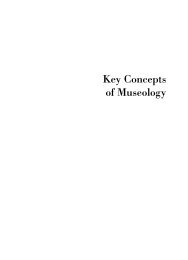ISS 25 (1995).pdf - The International Council of Museums
ISS 25 (1995).pdf - The International Council of Museums
ISS 25 (1995).pdf - The International Council of Museums
You also want an ePaper? Increase the reach of your titles
YUMPU automatically turns print PDFs into web optimized ePapers that Google loves.
original environment - as if it was possible to represent, through those fragments, the original<br />
context as a whole. We still see exhibits where such fragments are enumerated (with s<strong>of</strong>isticated<br />
design) under codes <strong>of</strong> rationality that do not correspond to the scientific paradigms <strong>of</strong> the XXth<br />
century.<br />
We see preservation and restauration works that pretend to serve the whole society, but<br />
that are nothing more than an opportunity <strong>of</strong> imposing aesthetic values and cultural codes <strong>of</strong><br />
hegemonic groups.<br />
<strong>The</strong> responsability <strong>of</strong> the museum in the present days is to be an active agent <strong>of</strong> social<br />
change, <strong>of</strong>fering support to programs <strong>of</strong> cultural development. And this is possible because, as an<br />
intellectual space for creativity, it produces knowledge. But, being aware <strong>of</strong> that, museum<br />
pr<strong>of</strong>essionals become responsible for promoting development in an open and democratic way,<br />
enabling the participation <strong>of</strong> wide segments <strong>of</strong> society. Those are the segments we perceive as<br />
·communities·. Which brings us to another problem, that is:<br />
b) THE CONCEPT OF COMMUNITY<br />
As the Museum, Community is a concept. Under the title' community" we usually refer<br />
to several representations <strong>of</strong> human society - from the global community, which includes all <strong>of</strong> us<br />
inhabitants <strong>of</strong> planet Earth, to the nuclear family as community core. But we must not forget the so<br />
called' biological communities· , formed <strong>of</strong> parcels <strong>of</strong> living beings with common characteristics.<br />
<strong>The</strong> plants in a forest, the fish in a river or a colony <strong>of</strong> microbes are communities as well - and as<br />
such, pertain to the museum sphere. We museum pr<strong>of</strong>essionals are also a community. As we see ,<br />
there is an immense diversity <strong>of</strong> communities. Biological communities. Cultural communities.<br />
Social communities .... Shouldn't the planets or our galaxy be also considered a community?<br />
Since we consider communities in their diversity, it becames clear that the relationship<br />
between Museum and Community is only possible when community and museum are previously<br />
identified. We have seen through the years the development <strong>of</strong> an opportunist discourse that has<br />
led to several mistakes such as:<br />
· the idea that Museum is a place called 'museum';<br />
· the idea that Community is a group <strong>of</strong> people not identified with the hegemonic strata<br />
<strong>of</strong> a society - preferably belonging to minority groups or to countries undergoing<br />
development;<br />
· the idea that museums should work with the community (whatever that means) .<br />
... To which community are we referring, when proposing museological action?<br />
Considering the different connections between Museum and Community, we should then<br />
identify:<br />
· what we believe a museum is;<br />
· what we believe a community is;<br />
· what museum and what community are we referring to , in each specific situation;<br />
· what is expected <strong>of</strong> the interaction between Museum and Community;<br />
· the several possible approaches to the matter;<br />
· the expected consequences <strong>of</strong> the interaction.<br />
Some options will be possible:<br />
97
















